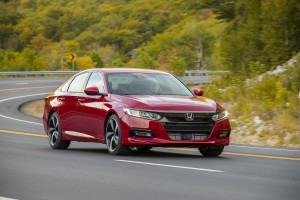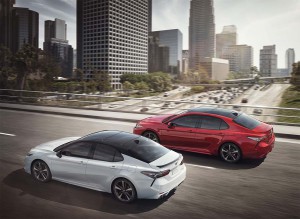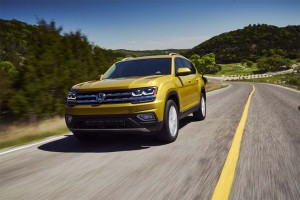Few recent product launches generated more buzz than the debut of the 2018 Honda Accord. Long one of the U.S. market’s best-selling nameplates, the 10th-generation sedan quickly racked up a slew of awards, including North American Car of the Year.
But despite all the rave reviews, Honda is struggling to retain momentum for the Accord. American motorists purchased just 21,751 of the sedans in April, a 19.3% year-over-year decline. And even when adjusting for the fact that April 2018 had two fewer sales days than the year before, the dip was 12.5 percent. And Honda isn’t alone. The completely redesigned 2018 Toyota Camry, a Car of the Year runner-up, suffered a 5.0% drop in volume in April.
“They’re both brand new vehicles and award winners, but I’m not sure that has any impact now,” said Joe Phillippi, head of AutoTrends Consulting. “Consumer tastes are changing. Everybody wants SUVs and CUVs.”
(Automakers suffer a cold start to a normally warm spring selling season. Click Here for more on April’s weak sales.)
Over the last several years, sales of sedans, coupes, convertibles and hatchbacks have collapsed as American buyers have shifted to the light trucks that accounted for about two-thirds of the new vehicle market. Utility vehicles – which include both classic, body-on-frame SUVs and newer, car-based CUVs – alone are generating half of the market’s volume. And industry planners expect the shift to continue for some time.

Honda brand chief Henio Arcangeli showed off the N.A. Car of the Year trophy for Accord at January's Detroit Auto Show.
“Passenger cars aren’t going to completely disappear,” added analyst Phillippi, but it’s far from clear how much lower demand will go before leveling off.
Ford Motor Co. clearly believes we haven’t come close to hitting bottom. The automaker’s once popular midsize sedan, the Fusion, posted a 22.9% drop last month, the big Taurus off 18.3%. And sales of the little Fiesta model declined 5.3%.
There wasn’t a single passenger car model in the Ford line-up, in fact, that was in positive territory, something that appeared to lend credibility to the automaker’s controversial decision, announced last month, to drop every one of its passenger car models but for the sporty Mustang. The Focus nameplate – which will soon see production moved to China – will remain part of the line-up, but only in the form of a new crossover model.
(And then there was one. Click Here for more on Ford’s strategy.)
Across the industry, the downward trend was readily apparent as automakers released April sales numbers on Tuesday – with the exception of General Motors which will now announce sales totals on a quarterly basis. On the whole, the auto industry had mixed results for the month, reflecting the overall weakening of the American market for the first time since the end of the Great Recession. But the cold snap that marked the beginning of spring was largely felt on the passenger car side of the ledger.
There were a few exceptions. While Camry tumbled, Toyota did report an 18.5% increase in demand for its full-size Avalon sedan, but that was the only model in the brand’s passenger car line-up to make it into positive territory. Only two models fared better for the upscale Lexus brand, notably the all-new LS flagship which jumped a spectacular 239.8% for the month. But at a total of 999 sedans sold in April, it barely moved the needle overall for Lexus.
Volkswagen was among the handful of automakers that reported overall sales gains in April, and the reason for its strength, after years of declining demand can be summed up in two words: Atlas and Tiguan.
“We are encouraged with the brand’s continued growth in the market, driven by the success of our two new SUVs,” said Derrick Hatami, executive vice president of Sales and Marketing for Volkswagen of America.
VW isn’t ready to follow Ford’s lead. It will launch a new version of its Jetta model this month, Hatami saying he hopes it will be “adding to the positive momentum,” though the lackluster reception given to other new sedans, such as the Accord and Camry, could be foreboding.
(Click Here for a review of the new 2019 VW Jetta.)
Automakers are now facing some tough choices when it comes to their line-ups. General Motors has also announced plans to drop slow-selling passenger cars. So far, that has been limited to the Chevrolet Sonic, but others, such as the big Chevy Impala, are also facing an uncertain future, according to company insiders. Fiat Chrysler has eliminated most of its passenger cars and could pull the plug on more, such as the big Chrysler 300 sedan.
“Even as we increase our sales of light trucks to record levels, we remain committed to delivering a balanced lineup of cars and light-truck offerings for our customers,” said Henio Arcangeli Jr., senior vice president of the Automobile Division & general manager of Honda sales.
Honda has demonstrated that commitment with plans to launch a third-generation Insight hybrid for 2019, but if it fails to catch on, some observers have suggested, Insight could also vanish from the market. The brand soon could pare back to just three passenger car models: Accord, Civic and Clarity, the latter a niche green machine offered with a choice of fuel-cell, plug-in hybrid or all-electric drivetrains.




I’m still driving my 2008 Camry Hybrid. Almost done breaking it in . Just past 103,000 miles. So far I’ve only had to pay for a new “Starting Battery “ starting to consider new spark plugs.
Regular maintenance, Always use Mobile 1 . NO OIL CONSUMPTION between changes! My Son drives a 2006 Camry SE. 240,000 miles . Starting to burn some oil.
Why buy new when you’ve got a great car?